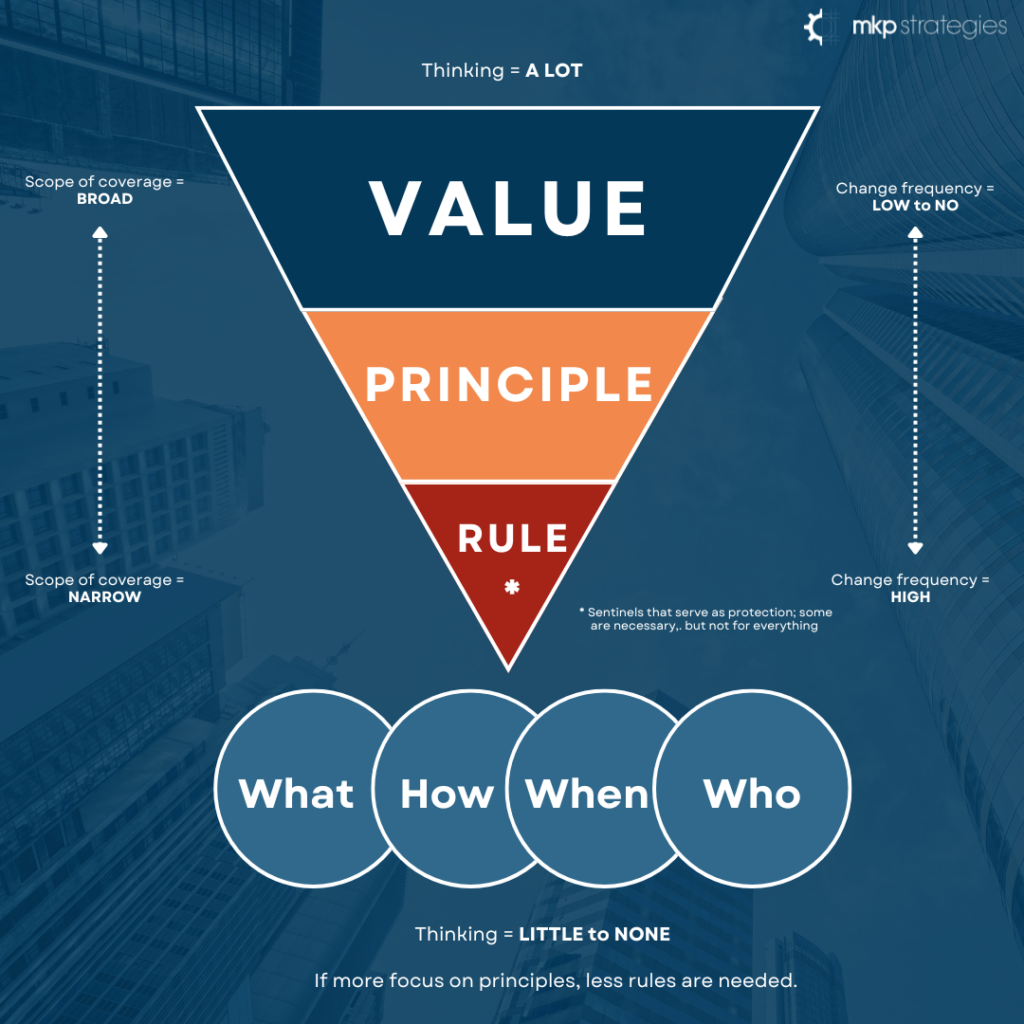In my work with businesses large and small, I often spend considerable time looking closely at an organization’s relationship between values, principles, and rules. Almost without fail, I’ve found that a higher understanding of the “why” behind actions can significantly reduce the need for an exhaustive set of rules – and lead to a more effective and efficient way of operating.
The Rule Overload Problem
The tendency for people and businesses to govern and control through rules is a common one. After all, rules are usually seen as the easiest way to guarantee compliance and uniformity in an organization. They tell us exactly what to do, when to do it, and how to do it – simple, right?
Not so fast!
A great example of this point is the U.S. legal system. Did you know that no one knows exactly how many laws exist in the United States? More laws are added every year, and many old laws remain on the books even when they no longer make sense or have become meaningless in today’s context.
These are just a few of my favorites – and yes, these are genuine laws that really exist today!
- In Connecticut, a pickle is not a pickle unless it bounces.
- In Maine, nobody is allowed to step out of a plane mid-flight.
- In Baltimore, Maryland, it is not permitted to take a lion to the movies.
- In Washington state, it is prohibited to harass Bigfoot.
- In Juneau, Alaska, flamingoes are not allowed in barber shops.
An overabundance of rules can create inefficiency, dismissiveness, and even confusion (how often do flamingoes wind up in Alaska, anyway?) rather than order, trust, and clarity.
The Role of Values and Principles
Values and principles, on the other hand, offer a much different approach. Values are the core beliefs that drive our actions, while principles are the guidelines that help us determine what is appropriate in a given situation. Together, they provide a framework that guides behavior without the need for an exhaustive list of rules.
When we embrace values and principles, we develop a higher “How-To IQ” – in other words, a deeper understanding of how to navigate complex situations by focusing on the underlying reasons for our actions.
This approach fosters a culture of trust, responsibility, and autonomy, where people are empowered to make decisions based on a shared understanding of what is important and why it matters.

Raising the View: A Practical Example
Consider a pharmaceutical company navigating the complex landscape of regulatory compliance. Instead of creating an exhaustive manual detailing specific rules for every conceivable compliance scenario, the company emphasizes the principle of patient safety and product integrity.
The focus shifts to training employees to understand why these principles are critical, encouraging them to internalize these values and apply them in their daily responsibilities.
Leaders and their teams are equipped with the knowledge to make informed decisions that uphold regulatory standards, resulting in patient safety and product efficacy. This approach not only simplifies the compliance framework, but also encourages a culture of responsibility and critical thinking.
By understanding the underlying principles, employees can navigate complex regulatory requirements more effectively, resulting in a more compliant and agile organization with fewer prescriptive rules but a stronger adherence to core values.
Benefits of Focusing on Principles
- Flexibility: Principles allow for flexibility and adaptation to new circumstances, whereas rigid rules can become outdated (as we saw with our state laws!), and irrelevant.
- Empowerment: Employees feel more empowered and engaged when they understand the “why” behind their actions and are trusted to make decisions.
- Efficiency: A principles-based approach reduces the need for constant rule-making and monitoring, leading to a more efficient and streamlined operation.
- Consistency: While rules can vary and multiply, principles provide a consistent foundation that can guide behavior across different situations and contexts.
The MKP Strategies Approach
This is just one of many different topics I cover in my executive coaching and training sessions. By helping clients shift from a rules-based to a principles-based approach, their organization can create a culture that prioritizes values and principles for more effective governance.
While rules have their place, an over-reliance on them can stifle innovation and responsiveness. Whatever the size, shape, or industry of your organization, I’m committed to guiding you through this transformation, helping you find the balance between necessary rules and empowering principles. Reach out today to find out how I can help your team.
